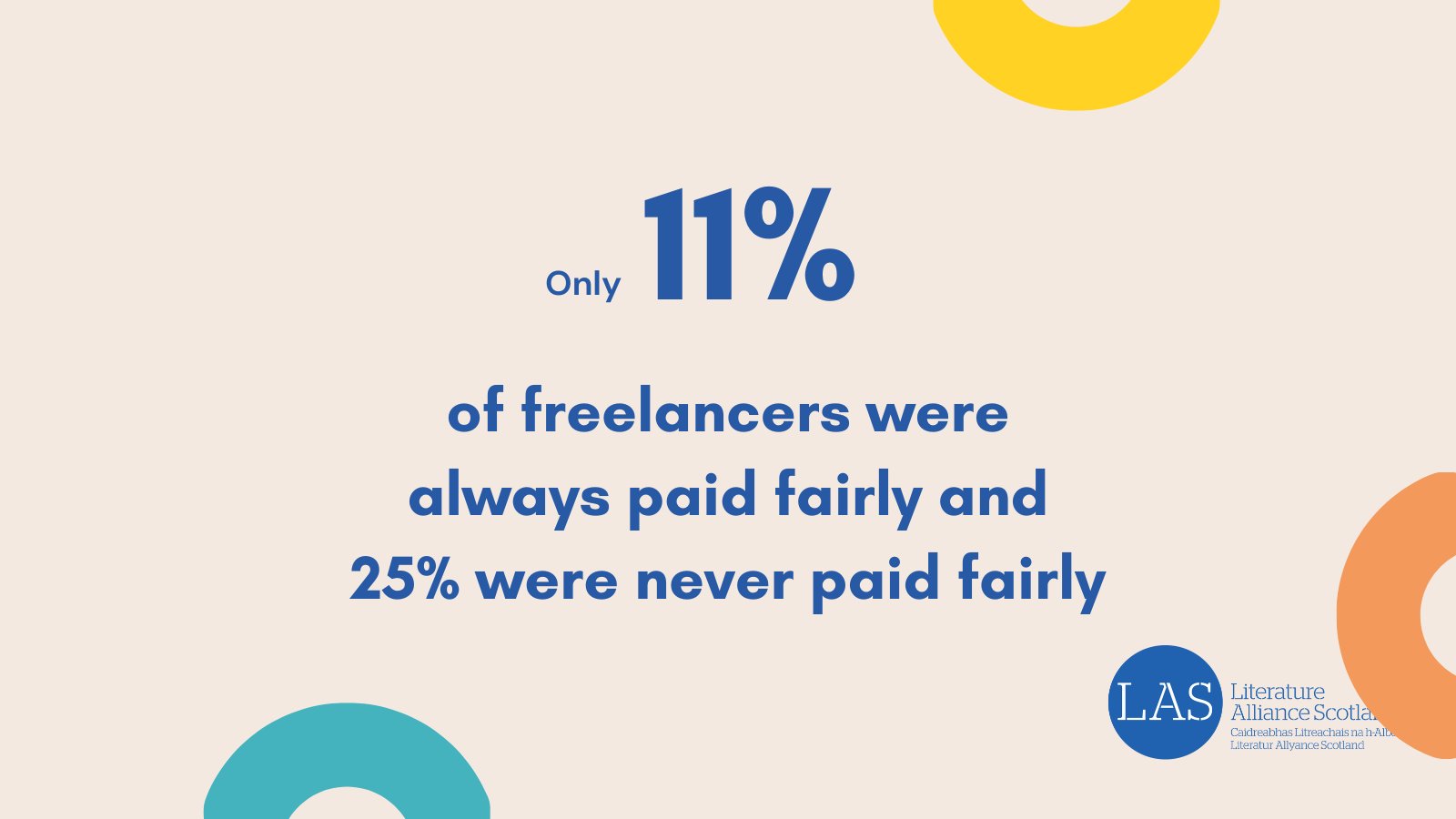Scotland’s largest literary network is urging arts organisations that engage freelance writers, editors, event organisers and arts administrators, proof readers, educators, publishers and programmers to value them better by offering fair and fast pay and fair working practices – or risk losing them from the sector completely.
The research, commissioned by LAS and conducted by Ruthless Research, provides a disturbing snapshot of the experiences, working patterns and conditions of Scotland’s current freelance and temporary workers in the literature, languages and publishing sector. The report highlights a complex and challenging picture that is reflected across Scotland’s creative industries. It shows that freelancers are withstanding an unsustainable financial and emotional level of precariousness. The impact of the Covid-19 pandemic, recent budget cuts and the cost-of-living crisis are all critical factors affecting freelance workers across the arts.
Based on a survey of 149 freelancers conducted last summer, the report reveals that only 11% of the freelancers were always paid fairly and 25% were never paid fairly. And around one in five (19%) of the freelancers are considering leaving the sector altogether, which would cause a catastrophic skill and labour gap.
Additionally, many freelancers reported experiencing low pay and difficulty negotiating fair day rates for the variety of skilled work they provide. The findings reveal the average annual full-time income of a literary freelancer in Scotland in 2022 was £21,140 – just under the Living Wage*. Many shared that they earn considerably less than this figure, with 66% making under £20k and more than a quarter (27%) earning less than £5k through freelance work in the sector. Disappointingly, disabled, emerging freelancers working part-time are more likely to earn under £5k per annum.
The findings highlight that most juggle portfolio careers comprising multiple roles, projects, clients and job-seeking opportunities. This magnifies the challenges of managing workloads and career trajectories for this essential cultural workforce.
The report also shows that 93% of freelancers agree that the sector relies on freelancers, however the majority of freelancers (58%) do not feel valued by the sector.
LAS has highlighted the impact of poor corporate practice on freelancers, and has called on arts organisations who engage freelance workers to ’embed four cornerstones of fair treatment for freelancers’.
- Pay fairly: 30% of freelancers felt that it is not possible to make a full-time living working in the sector. LAS recommends reading and implementing the SoA’s guidance on rates and fees
- Pay promptly: Pay within two weeks of completion of the work and expect enforceable charges for late payment. 7% of freelancers reported late payment of invoices as a barrier with 71% experiencing inconsistent cash flow/ income.
- Understand your ask: What unpaid expectations are you asking of freelancers, for example, preparation time, travel or subsistence costs? Almost all freelancers (99%) reported they had faced barriers and challenges within the course of their freelance work. This includes unpaid admin (73%), being expected to work for free (56%) and lack of rights compared to employees (55%).
- Review your hiring practices: Are opportunities offered transparently? 16% of the freelancers said that they experienced discrimination within the sector, particularly for disabled, emerging freelancers under 44 years of age.
Heather Parry, the SoA’s Senior Policy and Liaison Manager (Scotland), commented:
The results of this survey show both the important role that creative freelancers play in the literature sector and the huge challenges that such freelancers face working in that same sector. Unfortunately, much of what is reported here is not a surprise; we hear similar experiences from our members—especially when it comes to late payment, a disproportionately high administrative load, a lack of fair pay and the negative effects of the Covid-19 pandemic on incomes. That 99% of responders have faced barriers suggests that this industry simply does not know how to work fairly and collaboratively with creative freelancers.
It is clear that the literature sector cannot become a diverse, thriving, expansive landscape when working conditions for so many of its freelancers are poor. It is incumbent upon not only organisations and employers but also government to improve their frameworks for engaging with freelance workers, and to ensure that fair and timely pay, creative and worker rights, fair contracts and lessening paperwork are the keystones around which this work is done. As 93% of the respondents to this survey clarified, the sector relies on freelance workers—and yet, it fails to value them.






